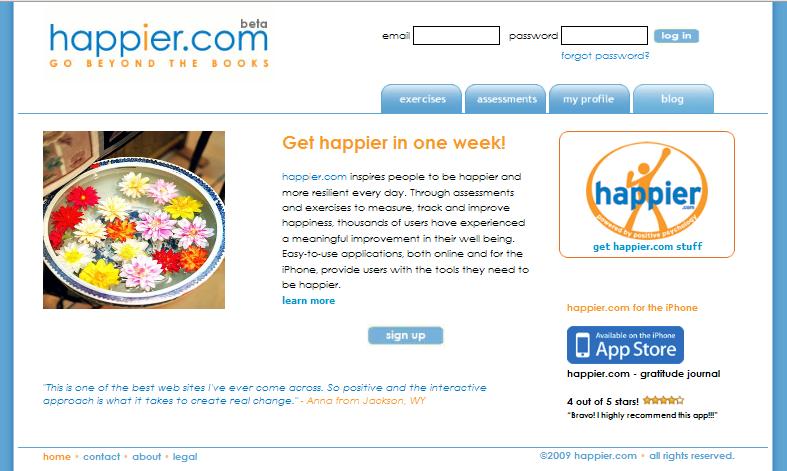
They offer a path to happiness, for five bucks.
Based on research from a noted University of Pennsylvania psychologist and coordinated by a team of three telecommuters in various Philadelphia neighborhoods, Happier.com is on the forefront of positive psychology and research dissemination.
Last week, the site rolled out a Freemium-style revenue strategy to its 20,000 users — a $4.99 monthly subscriber charge for full access to the site..
“The best researchers get up everyday trying to figure out how to get a grant, write a paper, be seen to fund their work,” said Andrew Rosenthal, a co-founder. “We get up everyday building tools for people to use this research.”
Happier launched in mid-November 2008 with the help of more than 30 largely Radnor-based individuals and family trusts . They are not investing through a formal group. Rosenthal’s fellow founder is Doug Hensch, a Philly native who now lives outside of Washington, D.C., serves as chief operating officer and handles the firm’s product development. The small staff also includes Robb McCall who works from his Northern Liberties home and serves as director of customer service. Director of technology development is Mike Eidlem, who works from his Pennsport home.
A free registration will get you trackable, validated assessments and a limited amount of research-based exercises. The paid membership offers access to a host of such exercises, aimed at finding just what keeps you down and how to get away from it, in addition to video, writing from field-based academics and other assessments designed to measure otherwise intangibles like optimism, personal strengths and, yes, happiness.
Below, watch a demonstration of Happier.com.
[tech]bzEPEEiMLt4[/tech]
“You’ll get advice on what to start doing tonight and tomorrow. Within a week, you’ll notice a chance in thinking about what went well and why,” Rosenthal, 25, says. “You’re going to feel better.”
The touchstone of the project is Penn professor Dr. Martin Seligman, though Happier is independent of the university and pays consulting fees to Seligman. (Watch Seligman discuss the site’s benefits.)
His research, that has come to be known as positive psychology, is considered the scientific study of the virtues that enable individuals or communities to develop and thrive. The field of study, which has found an industry hub at Penn’s Positive Psychology Center, has three primary focuses: positive emotions, positive individual traits and positive institutions.
If it all seems a little mushy, that’s because it’s just so gosh darn young. Seligman, Rosenthal and the rest of the Happier crew are presenting at the first World Congress on Positive Psychology, to be held in Center City in June. It will be the first international confab on what makes some folks smile and others frown.
“People have been studying happiness from Buddas to the Llamas for thousands of years, but it was ten years ago when someone really sat down and said, ‘Let’s use the research we have and evaluate what actually works,'” says Rosenthal, who lives in Rittenhouse. “Everyone’s mother has a suggestion, but it was the first time there was rigorous study and design through replication to validate and verify. That started at Penn. That started in Philadelphia.”
But it’s certainly gone global. There are master’s degrees for positive psychology in the United Kingdom. The Australian government has begun funding research to help find how to keep their residents chummy, Rosenthal says. The Bhutan government evaluates its own gross national happiness.
 “There is a deep academic history and access to the best researchers in the field here, so this is where we are going to be,” says Rosenthal, who moved here from Portland-Oregon in 2002. “The creative class is growing stronger everyday.”
“There is a deep academic history and access to the best researchers in the field here, so this is where we are going to be,” says Rosenthal, who moved here from Portland-Oregon in 2002. “The creative class is growing stronger everyday.”
Happier is more than a for-profit business, he says.
Though they maintain a strict privacy agreement, the Happier project does give the team great access to raw data that can further the field’s progress.
“We’re leading the way on this new methodology for dissemination of positive psychology tools,” says Rosenthal, who also serves as the young firm’s marketing director.
They’ve been promoting through pay-per-click AdWords in Gmail.
“So someone is writing to a friend about breaking up with her boyfriend and there is an ad for Happier.com, about solutions and help.” Rosenthal said. “We’ve gotten viral response to that. People are on Twitter talking about those ads… sending us more traffic.”
Rosenthal himself has worked in the academic field, implementing similar research at a school in Australia.
“There is a strong desire among a lot of people to find ways to be happier. The academic pace is not keeping up, and not everyone is interested in buying a book and often that isn’t enough anyway,” Rosenthal says. “Sometimes you need that help to get to where you can be. People want that tool. They want to see change on a computer screen. That online method is letting us effectively combine science and happiness.”
“It feels great to get tools out there that are helping people because, of course, there seems to be more distress and despair now than in recent memory,” he says.
Rosenthal also serves as president of the regional Penn alumni group and says he has seen an increase in the “conversation on innovation” in Philadelphia.
Upcoming features include text-message reminders for self-assessments, in addition to a continually growing list of exercises and tools that more specifically target individuals. There technology break-through, which isn’t quite ready for display, is a customized algorithm for each user, more accurately measuring causes, effects and being able to offer more customized advice for action and defense of a happier life.
“You don’t need a therapist to be happy. That’s the breakthrough,” Rosenthal said. “You can do it on your own, and we want to help.”
Below watch Dr. Seligman discuss Happier.com’s iPhone application.
[tech]dwkDEM4gFBA[/tech]
Every Monday, Technically Not Tech will feature people, projects, and businesses that are involved with Philly’s tech scene, but aren’t necessarily technology focused. See others here.
Technically Not Tech: How Happier.com will make itself money and you, well, happier







